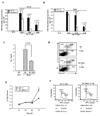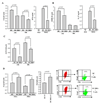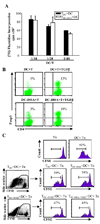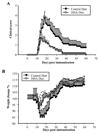Docosahexaenoic acid prevents dendritic cell maturation, inhibits antigen-specific Th1/Th17 differentiation and suppresses experimental autoimmune encephalomyelitis
- PMID: 20854895
- PMCID: PMC3031664
- DOI: 10.1016/j.bbi.2010.09.012
Docosahexaenoic acid prevents dendritic cell maturation, inhibits antigen-specific Th1/Th17 differentiation and suppresses experimental autoimmune encephalomyelitis
Abstract
Docosahexaenoic acid (DHA), the most abundant essential n-3 polyunsaturated fatty acid in the CNS, emerged recently together with eicosapentaenoic acid (EPA) and DHA/EPA metabolic derivatives as a major player in the resolution of inflammation. Protective anti-inflammatory effects of DHA were reported in clinical studies and animal models of colitis, sepsis, and stroke. Here we report for the first time a beneficial effect of dietary n-3 fatty acids in experimental autoimmune encephalomyelitis (EAE), a model for human multiple sclerosis. In the present study we investigated the effects of DHA on the function of bone marrow-derived dendritic cells (DC) in CD4(+) T cell stimulation and differentiation. Pretreatment of DC with DHA prevented LPS-induced DC maturation, maintaining an immature phenotype characterized by low expression of costimulatory molecules and lack of proinflammatory cytokine production (IL-12p70, IL-6, and IL-23). DHA-treated DC were poor stimulators of antigen-specific T cells in terms of proliferation and Th1/Th17 differentiation. This was associated with an increase in p27(kip1), a cell cycle arresting agent, and with decreases in Tbet, GATA-3, and RORγt, master transcription factors for Th1, Th2, and Th17. In contrast, T cells co-cultured with DC-DHA express higher levels of TGFβ and Foxp3, without exhibiting a functional Treg phenotype. Similar to the in vitro results, the beneficial effect of DHA in EAE was associated with reduced numbers of IFNγ- and IL-17-producing CD4(+) T cells in both spleen and CNS.
Copyright © 2010 Elsevier Inc. All rights reserved.
Conflict of interest statement
Figures






References
-
- Arita M, Yoshida M, Hong S, Tjonahen E, Glickman JN, Petasis NA, Blumberg RS, Serhan CN. Resolvin E1, an endogenous lipid mediator derived from omega-3 eicosapentaenoic acid, protects against 2,4,6-trinitrobenzene sulfonic acid-induced colitis. Proc Natl Acad Sci U S A. 2005;102:7671–7676. - PMC - PubMed
-
- Attakpa E, Hichami A, Simonin AM, Sanson EG, Dramane KL, Khan NA. Docosahexaenoic acid modulates the expression of T-bet and GATA-3 transcription factors, independently of PPARalpha, through suppression of MAP kinase activation. Biochimie. 2009;91:1359–1365. - PubMed
-
- Bailes JE, Mills JD. Docosahexaenoic acid (DHA) Reduces Traumatic Axonal Injury in a Rodent Head Injury Model. J Neurotrauma. 2010 - PubMed
-
- Bailey SL, Schreiner B, McMahon EJ, Miller SD. CNS myeloid DCs presenting endogenous myelin peptides ‘preferentially’ polarize CD4+ T(H)−17 cells in relapsing EAE. Nat Immunol. 2007;8:172–180. - PubMed
-
- Bannenberg GL. Resolvins: Current understanding and future potential in the control of inflammation. Curr Opin Drug Discov Devel. 2009;12:644–658. - PubMed
Publication types
MeSH terms
Substances
Grants and funding
LinkOut - more resources
Full Text Sources
Other Literature Sources
Research Materials
Miscellaneous

